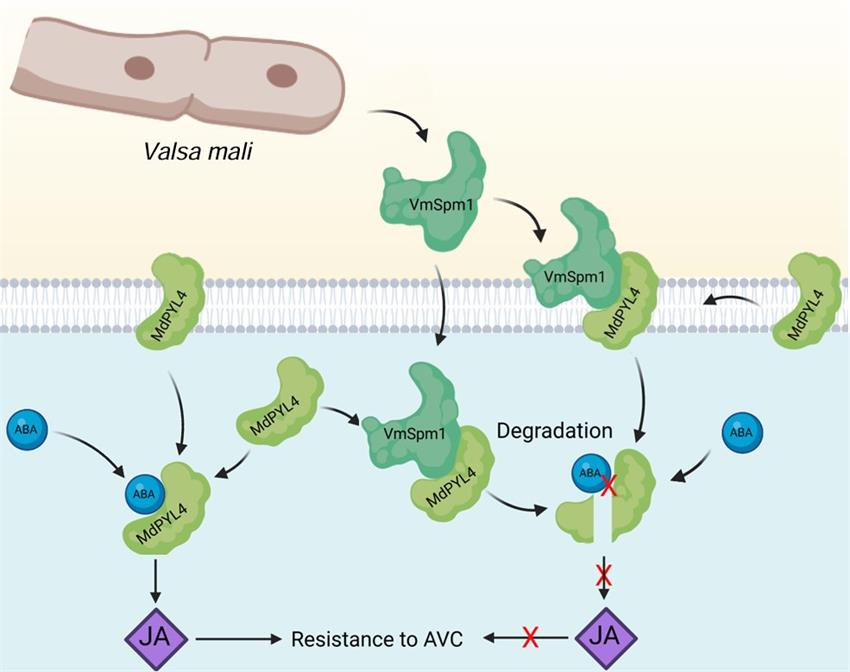Recently, Professor Huang Lili's research group under the Research Center of Fruit Tree Diseases and Prevention from our college published a research paper titled "VmSpm1: a secretory protein from Valsa mali that targets apple's abscisic acid receptor MdPYL4 to suppress jasmonic acid signaling and enhance infection" in New Phytologist. This study, which utilized methods from molecular biology, genetics, and biochemistry, unveiled a new mechanism by which the effector protein VmSpm1 from Valsa mali disrupts plant immunity by manipulating apple jasmonic acid signaling. Meng Yangguang, a Ph.D student of our college, and Xiao Yingzhu, a graduated master student of our college, are the co-first authors. Professor Huang Lili and Associate Professor Xu Liangsheng are the corresponding authors of this paper.
Apple Valsa canker caused by Valsa mali is a devastating disease that seriously affects the healthy development of the apple industry. Jasmonic acid is a key hormone that enhances plant resistance to necrotrophic pathogens, and plant pathogens have developed various methods to counteract jasmonic acid-induced defenses. One such method is by secreting effector proteins to interfere with the biosynthesis and signaling of jasmonic acid (JA). However, the mechanism by which V. mali manipulates host hormone signaling to affect plant immunity through the secretion of effector proteins remains unclear.VmSpm1 is a serine protease highly expressed during V. mali infection of the host. Deletion of VmSpm1 results in a significant reduction in virulence, and heterologous expression of VmSpm1 in apples promotes V. mali infection, indicating that VmSpm1 is an important virulence factor of V. mali. Further research found that VmSpm1 interacts with an abscisic acid receptor, MdPYL4. MdPYL4 promotes the biosynthesis and signaling of jasmonic acid in apples by perceiving abscisic acid, thereby enhancing apple resistance to V. mali. VmSpm1, however, inhibits the biosynthesis and signaling of jasmonic acid in apples during V. mali infection by degrading MdPYL4, thereby weakening apple resistance to V. mali. This study reveals a new mechanism by which V. mali uses VmSpm1 to manipulate apple jasmonic acid signaling to disrupt plant immunity, providing a new perspective for deepening the understanding of plant hormone crosstalk and plant-pathogen interactions and offering potential targets for developing new resistance strategies against Valsa mali.

The experimental platform of the State Key laboratory for Crop Stress Resistance and High-Efficiency Production provided technical support for this research. This study was funded by the National Natural Science Foundation of China.
Original article link: https://doi.org/10.1111/nph.20194